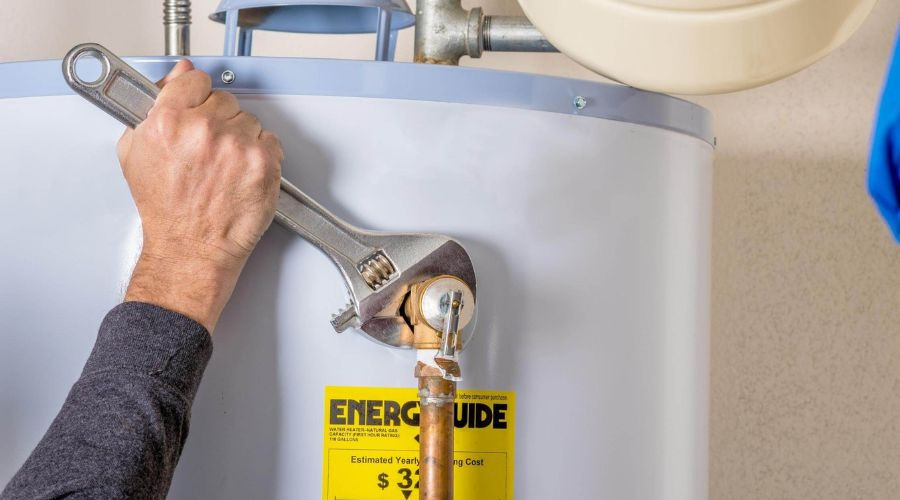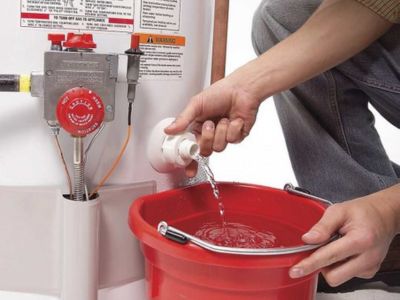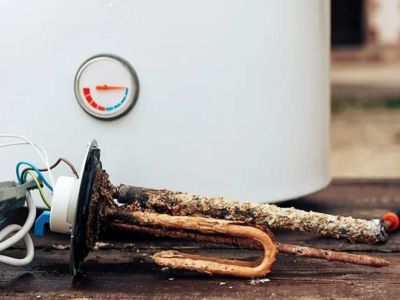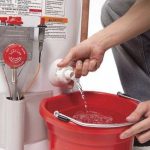
The Importance of Water Heater Maintenance
Water heaters need to be cleaned on an annual basis. Because they already contain moving water, many homeowners assume they are self-cleaning devices. Unfortunately, all water heaters will eventually collect small pieces of debris, and if the tank is not maintained correctly, this can impact the health of a household.
How to Flush a Water Heater

Depending on the type, a hot water tank can be turned off in several ways. Electric water heaters are directly shut off from the fuse box. Gas water heaters have a thermostat that can be switched to pilot mode. A valve at the top of the tank will allow homeowners to turn off the cold water supply.
Once the tank water has cooled, the drain valve can safely connect to a garden house. The hose will need to drain the water heater into a bathtub or sink. Tanks that have never been cleaned or not in a long time will need a technician to handle the pressure-relief valve. A plumber will have all the tools necessary to complete water heater cleaning at one time.
Additional Water Heater Inspections

The pressure valve can prevent the hot water tank from exploding. If it works correctly, the valve will open automatically if the pressure builds too high. If the pressure valve is blocked, it cannot release unnecessary build-up. Checking the valves during maintenance is vital for the longevity of a hot water tank.
An anode rod is another essential component that will not last forever. This is a metal rod found inside the tank that protects the walls of the water heater. Like a magnet, this rod attracts minerals and other sediments in the water heater to protect tank walls from corrosion. Typically a water heater anode rod must be replaced every 3 to 5 years. It is not easy to replace the rod because of its location. Hiring a plumber is the safest way to inspect and replace the rod.
Benefits of Preventative Maintenance
Water heaters typically last between 10 and 15 years, depending on how they are taken care of. With annual inspections and cleanings, a water heater can last 20 years. Besides longer lifespans, routine maintenance also leads to lower energy bills from better energy efficiency. Although maintaining an already-working appliance may seem like an extra fee, repairs can be extremely costly. Maintenance is a small price to pay to avoid surprise cold showers, expensive repairs, and early replacements.
Tankless water heaters have a longer lifespan but still, require annual maintenance. This will help homeowners keep their warranty valid. There are a few tell-tale signs that repairs may already be necessary. If a water heater begins to make strange noises or produces rusty-colored water, there could be excessive sediment in the tank. Decreased hot water is usually a sign the tank has reached old age.
About Gillece Services
Gillece Services has been serving the community for over 40 years. Their plumbers offer personalized solutions, upfront pricing, and repairs. For water heater services and multiple repair options without hourly fees, call Gillece Services in Pittsburgh, PA.
Distribution Links +
- htv10.tv
- wicz.com
- snntv.com
- central.newschannelnebraska.com
- metro.newschannelnebraska.com
- midplains.newschannelnebraska.com
- northeast.newschannelnebraska.com
- plattevalley.newschannelnebraska.com
- panhandle.newschannelnebraska.com
- wpgxfox28.com
- lifestyle.mykmlk.com
- wtnzfox43.com
- lifestyle.3wzfm.com
- lifestyle.southernsportstoday.com
- lifestyle.thepodcastpark.com
- lifestyle.680thefan.com
- lifestyle.xtra1063.com
- lifestyle.953hlf.com
- lifestyle.rewind1019.com
- lifestyle.us983.com
- lifestyle.countrylegends1059.com
- lifestyle.967wshv.com
- lifestyle.1045thedan.com
- yournewsnet.com
- michigan.yournewsnet.com
- lifestyle.earl983.com
- lifestyle.maverick1023.com
- lifestyle.magic979wtrg.com
- lifestyle.1077lakefm.com
- https://smb.americustimesrecorder.com
- https://smb.atmoreadvance.com
- https://smb.amnews.com
- https://smb.austindailyherald.com
- https://smb.americanpress.com
- https://smb.dailyleader.com
- https://smb.oxfordeagle.com
- https://smb.vicksburgpost.com
- https://smb.bluegrasslive.com
- https://smb.claiborneprogress.net
- https://smb.clantonadvertiser.com
- https://smb.brewtonstandard.com
- https://smb.demopolistimes.com
- https://smb.elizabethton.com
- https://smb.greenvilleadvocate.com
- https://smb.jessaminejournal.com
- https://smb.kenbridgevictoriadispatch.com
- https://smb.leaderpub.com
- https://smb.luvernejournal.com
- https://smb.selmatimesjournal.com
- https://smb.thesnaponline.com
- https://smb.troymessenger.com
- https://smb.windsorweekly.com
- https://smb.clemmonscourier.net
- https://smb.gatescountyindex.com
- https://smb.harlandaily.com
- https://smb.irontontribune.com
- https://smb.ourdavie.com
- https://smb.state-journal.com
- https://smb.thecharlottegazette.com
- https://smb.thecoastlandtimes.com








